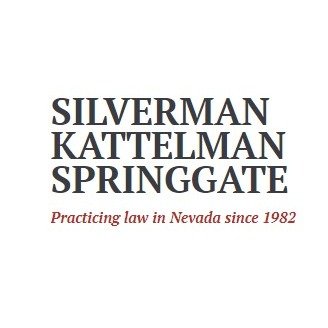Best Tax Increment Financing Lawyers in Reno
Share your needs with us, get contacted by law firms.
Free. Takes 2 min.
List of the best lawyers in Reno, United States
About Tax Increment Financing Law in Reno, United States
Tax Increment Financing (TIF) is a public financing method that is used as a subsidy for redevelopment, infrastructure, and other community-improvement projects in many countries, including the United States. In Reno, TIF is employed to stimulate economic development, improve infrastructure, and revitalize underserved or deteriorating areas. Essentially, TIF enables municipalities to finance public improvements and infrastructure through increased property tax revenues, or the 'tax increment,' anticipated from a new development rather than depending on traditional funding mechanisms.
Why You May Need a Lawyer
There are several situations where legal assistance may be required relating to TIF in Reno:
- Project Development and Approval: Developers may need legal guidance when preparing project proposals to ensure compliance with local laws and maximize financial benefits under TIF.
- Property Tax Disputes: Legal help might be necessary for resolving disputes related to tax assessments or increments that affect a TIF district.
- Negotiating Terms: Lawyers can assist developers, businesses, or municipalities in negotiating and drafting TIF agreements to ensure clarity and legality.
- Investment and Financing: Legal counsel can provide advice on structuring investments and securing financing for TIF-funded projects.
- Compliance and Reporting: Ensuring compliance with TIF-related reporting requirements and legal obligations often necessitates expert legal advice.
Local Laws Overview
In Reno, local laws concerning TIF are built around Nevada state statutes governing redevelopment and economic development. Key aspects include:
- Creation of TIF Districts: The establishment of TIF districts is subject to approval by local government bodies and must meet specific criteria focused on necessary economic improvements.
- Eligible Costs: TIF funds can cover costs like public infrastructure, land acquisition, and environmental remediation but must align with the project's objectives as outlined in the TIF agreement.
- Project Plans: Detailed project plans must be submitted, highlighting how the TIF will promote economic growth, detailing projected expenses versus anticipated tax increment revenue.
- Transparency and Accountability: Legal requirements for public hearings and annual financial reports maintain transparency and hold municipalities accountable for TIF district performance.
Frequently Asked Questions
What is the purpose of TIF in Reno?
In Reno, TIF is primarily used to revitalize underdeveloped areas, stimulate economic development, and improve infrastructure without raising taxes.
How is a TIF district established in Reno?
A TIF district is established through a process that requires approval from Reno’s city council or other local governmental bodies. Applicants must demonstrate that an area is eligible and economically needy.
What types of projects can benefit from TIF?
Projects that typically benefit include infrastructure upgrades, affordable housing developments, and commercial projects that lead to job creation and increased property values.
Who oversees TIF district management?
TIF districts in Reno are managed under the oversight of local governmental bodies such as the redevelopment agency, ensuring compliance and efficient management of funds.
How are tax increments calculated?
The tax increment is the difference between the amount of property tax revenue generated before the TIF district establishment and after new development takes place.
Are there risks associated with TIF?
Yes, risks include overestimating the revenue from new developments, potentially leading to shortfalls in funding, and the possibility of increased property taxes if developments underperform.
Can TIF funds be used for private business expenses?
No, TIF funds are typically allocated for public improvements that support the development project rather than private business expenses.
How long do TIF districts last?
In Reno, like different parts of the U.S., TIF districts typically exist for a period of 20-30 years, although this can vary based on specific local government regulations and project needs.
Can property owners appeal tax assessments for TIF districts?
Yes, property owners have the right to appeal their assessments with local taxing authorities if they believe there are inaccuracies or unjust assessments.
What happens after a TIF district expires?
Once a TIF district expires, the increased property tax revenues begin to flow to the regular taxing districts, including schools and other public services, potentially leading to improved financial resources for these entities.
Additional Resources
Below are some resources that may be helpful for those seeking information or legal advice regarding TIF in Reno:
- City of Reno's Economic Development Office: Offers resources and information about city planning initiatives and redevelopment efforts.
- Nevada Department of Business and Industry: Provides guidance on economic development initiatives in Nevada.
- Reno Redevelopment Agency: Responsible for formally evaluating, approving, and managing TIF projects in Reno.
- Legal aid organizations specializing in business or property law in Nevada.
Next Steps
If you require legal assistance regarding TIF in Reno, consider the following approach:
- Consultation: Schedule a consultation with a lawyer experienced in TIF and redevelopment law in Nevada. Clearly outline your needs and objectives.
- Document Review: Have your TIF proposals, agreements, or existing legal documents reviewed for compliance and efficiency.
- Legal Representation: Consider ongoing legal representation to assist with negotiations and help maintain compliance throughout the TIF project lifecycle.
Lawzana helps you find the best lawyers and law firms in Reno through a curated and pre-screened list of qualified legal professionals. Our platform offers rankings and detailed profiles of attorneys and law firms, allowing you to compare based on practice areas, including Tax Increment Financing, experience, and client feedback.
Each profile includes a description of the firm's areas of practice, client reviews, team members and partners, year of establishment, spoken languages, office locations, contact information, social media presence, and any published articles or resources. Most firms on our platform speak English and are experienced in both local and international legal matters.
Get a quote from top-rated law firms in Reno, United States — quickly, securely, and without unnecessary hassle.
Disclaimer:
The information provided on this page is for general informational purposes only and does not constitute legal advice. While we strive to ensure the accuracy and relevance of the content, legal information may change over time, and interpretations of the law can vary. You should always consult with a qualified legal professional for advice specific to your situation.
We disclaim all liability for actions taken or not taken based on the content of this page. If you believe any information is incorrect or outdated, please contact us, and we will review and update it where appropriate.











